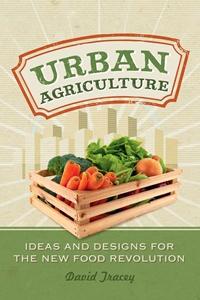 Though I personally am cheered by the sight of a P-Patch, a front garden, or a tiny apartment balcony resplendent with edible plants, there is still resistance to seeing raised beds replete with tomatoes and lettuce overtake a lawn or other underutilized space. Activist and arborist David Tracey’s Urban Agriculture: Ideas and Designs for the New Food Revolution opens with an account of conflict over creating a community garden in his native Vancouver, B.C. Despite this negative note, the book is an antidote to despair. Tracey’s informal and humorous style diminishes the sense of helplessness we feel in the face of corporate control over our food supply, and its attendant environmental devastation and cost to human health. Tracey does not provide detailed directions on how to grow various vegetables from seed, or how to make your own compost; his purpose is to inspire and empower the reader to begin or continue the worthwhile work of growing food (as opposed to “fuud,” the term he coins for the products of Big Ag). You may not think you are engaged in agricultural pursuits but by the author’s definition, anyone who grows edible plants is a farmer.
Though I personally am cheered by the sight of a P-Patch, a front garden, or a tiny apartment balcony resplendent with edible plants, there is still resistance to seeing raised beds replete with tomatoes and lettuce overtake a lawn or other underutilized space. Activist and arborist David Tracey’s Urban Agriculture: Ideas and Designs for the New Food Revolution opens with an account of conflict over creating a community garden in his native Vancouver, B.C. Despite this negative note, the book is an antidote to despair. Tracey’s informal and humorous style diminishes the sense of helplessness we feel in the face of corporate control over our food supply, and its attendant environmental devastation and cost to human health. Tracey does not provide detailed directions on how to grow various vegetables from seed, or how to make your own compost; his purpose is to inspire and empower the reader to begin or continue the worthwhile work of growing food (as opposed to “fuud,” the term he coins for the products of Big Ag). You may not think you are engaged in agricultural pursuits but by the author’s definition, anyone who grows edible plants is a farmer.
The book is explicitly organized from the smallest to largest scale of edible cultivation (sprouts on the kitchen counter to full-scale farming). There are some unusual inclusions here, such as sections on aquaponics (in case you want to grow fish and greens together!) and school farms, the self-sufficiency model of Cuba’s urban farming project, and a checklist of questions to ask politicians before the next election (ask where she or he stands on the use of public space to grow food by raising the concept of usufruct, the legal right to use and enjoy the fruits or profits of something belonging to another). There are numerous quotable lines in this book, such as: “It takes food to grow a village,” and “The seed knows what to do.” The library also has his previous book, Guerrilla Gardening: A Manualfesto.